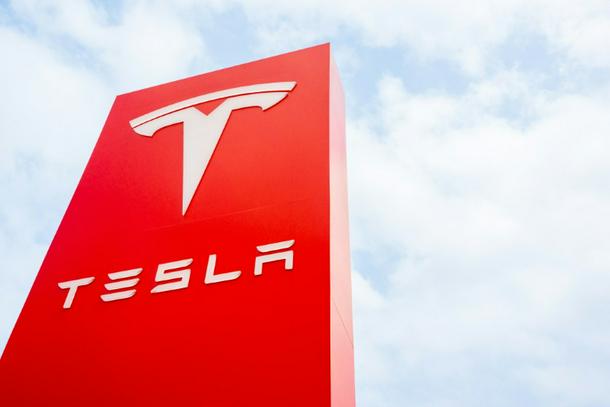
Tesla watchers are expecting the company to unveil a prototype of its robotaxi -- and are watching with both anticipation and skepticism
Los Angeles (United States) (AFP) - Tesla fans were kept waiting on Thursday for the unveiling of Elon Musk’s robotaxi, years after the brash billionaire first promised a car that could drive itself.
The company’s CEO is a master showman, whose ability to generate hype has helped make Tesla the world’s best selling EV and propelled the firm’s share price sky high, making him the richest man on the planet in the process.
And he’s currently employing those talents in the service of Republican Donald Trump, echoing the billionaire presidential candidate’s dire warnings about migrants and a crumbling America, including during an exuberant appearance at a weekend Trump rally that was widely mocked.
Little is known about what to expect at Thursday’s unveiling at an event dubbed “We, Robot” (a play on Isaac Asimov’s sci-fi classic ‘I, Robot’) that will take place at the Warner Brothers studio lot near Los Angeles.
But more than 40 minutes after it was supposed to start, tens of thousands of people waiting to see the livestream were left watching the product of a graphics generator.
Various crypto scams were stepping into the breach on YouTube, with AI-generated Musks urging viewers to send their Bitcoins for supposed huge profits.
Musk told users on X – the platform formerly known as Twitter – that event staff were dealing with an emergency.
“A person in the crowd had a medical emergency. We have taken care of them and will be starting shortly,” he wrote.
The launch will be closely watched – both by the boosters who are convinced he is a visionary changing the world, and by the skeptics who increasingly see an emperor with threadbare clothes.
“We believe wide-scale Tesla robotaxi deployment is unlikely within the coming years,” said a note from UBS last month.
“That is not to say Tesla isn’t making technological progress, but Tesla needs to show that the tech is ready and safe, deal with a myriad of local regulations and (potentially) figure out logistics and operations of a transportation network company.”
On the bullish side, analysts Wedbush predicted Thursday’s event will be a “seminal and historical day” for Tesla, ushering in a new chapter of growth for autonomous technology.
- ‘Important changes’ -
If Tesla successfully shows off a taxi that can drive itself, it won’t be the first.
Other companies, such as Google’s Waymo and General Motors Cruise, have operated heavily regulated pilot programs for a few years already.
But, says Musk, with characteristic bravura, his will be the best.
The South African-born entrepreneur pushed back the date of the event, which was originally planned for August, “to make some important changes that I think would improve the vehicle,” he said in July.
He shrugged off regulatory questions about a technology venture that has so far only been demonstrated on a limited terrain and remains unseen by most of the general public.
“Once we demonstrate that something is safe enough or significantly safer than human, we find that regulators are supportive of deployment of that capability,” he said at the time.
Forget that he said in 2016 a fully automated car was two years away, or that a year later he was touting a vehicle by 2019 so clever that customers would be able to sleep while it drove them around.
As many car makers have found, self-driving is tricky.
While lots of cars nowadays have limited automation, theoretically allowing the driver to cede some of the boring bits of driving to an onboard computer, the person behind the wheel still has to pay attention and jump in if the car does something unpredictable.
That’s because computers, unlike people, are not very good at reacting to unexpected events or situations they have never seen before, so self-driving vehicles have a history of doing things that a human would never do.
The driver is in any case legally liable for what the car does. Tesla is facing a number of lawsuits stemming from deadly crashes in which drivers may have believed they were safe in the hands of the car’s computer.
It’s in this context that some industry watchers are taking Thursday’s expected announcements with a pinch of salt.
“It seems likely that we’ll see a cool demo of a stylish-looking prototype, allowing Musk to claim a kind of victory for first impressions, even when the rough outlines of what he promises will barely hold up to scrutiny,” wrote Andrew Hawkins of tech outlet The Verge.
“The exaltations from bullish investors will give him enough cover to continue to make misleading declarations about what is and isn’t autonomous.
“And the safety experts and competitors who try to warn about the dangers of his approach will likely be drowned out or dismissed by his most ardent fans.”